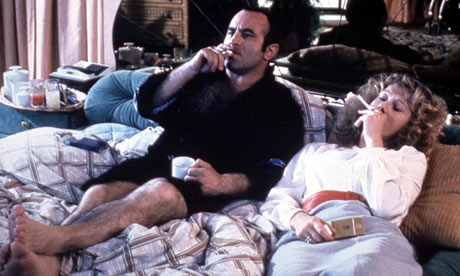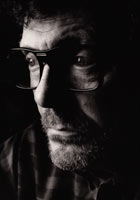
Bob Hoskins and Helen Mirren in The Long Good Friday.
People who talk wistfully of the "golden age of British television drama" are often accused of viewing the past through the rosy lens of nostalgia. But a clear-eyed examination of the era proves that such slots as the BBC's The Wednesday Play (1964-70) and Play for Today (1970-84) were unsurpassed as breeding grounds for talented directors such as John Mackenzie, who has died after a stroke aged 83. Like most of his contemporaries who gained their experience by working in television – Philip Saville, Michael Lindsay-Hogg, Ken Loach, Mike Newell, Michael Apted and Mike Leigh – Mackenzie went on to make feature films, notably his superb London-based gangster picture, The Long Good Friday (1980).
The television background trained Mackenzie to work quickly on taut and realistic narratives, within a tight budget and on schedule. One of his first jobs was as production assistant to Loach on Up the Junction (1965), a Wednesday Play with Carol White as a factory worker. Mackenzie's subsequent television projects followed Loach's naturalistic, anti-establishment approach, especially his collaborations with the former Glasgow shipyard worker Peter McDougall, of which he was most proud. It was McDougall who dubbed him "Frenzy Mackenzie" because of his unstoppable energy.
The first of their three scripts for Play for Today was Just Another Saturday (1975), about the annual Orange Order march in Glasgow, and the violence against Catholic homes on the route. The project was initially banned after the head of the Glasgow police said that the script would cause "bloodshed on the streets in the making and in the showing". But after a year, Mackenzie managed to persuade the BBC to press ahead with the play, which eventually was very well received.
The Elephant's Graveyard (1976) was a funny and moving two-hander featuring Billy Connolly and Jon Morrison (who were both in the previous play) as two married men who escape responsibility by taking off to the hills above Greenock in Scotland. Just a Boys' Game (1979) was a story of gangs in Greenock. Mackenzie and McDougall's last collaboration was on the feature film A Sense of Freedom (1979), based on the autobiography of the Glaswegian gangster Jimmy Boyle, detailing his crimes and subsequent reform, shot in a powerful semi-documentary style.
 Mackenzie's TV background led him to work quickly on taut, realistic narratives.
Mackenzie's TV background led him to work quickly on taut, realistic narratives. The Edinburgh-born Mackenzie's own background differed from the underworld and working-class denizens he depicted. Mackenzie, whose father was an engineer, was educated at Holy Cross academy in Edinburgh and read history at Edinburgh University, before studying drama and joining the city's Gateway Theatre Company as an actor. In 1956, soon after his marriage to Wendy Marshall, whom he had met at drama school, he moved to London, where he took various jobs, including teaching, prior to be was taken on by the BBC in the early 1960s.
While directing television plays, Mackenzie got to make a few features including Unman, Wittering and Zigo (1971), a creepy thriller set in a boys' public school, for which he abandoned social realism. He returned to Loach territory with Made (1972), based on Howard Barker's play, in which a single mother (Carol White) struggles to survive in a drab part of London. The film demonstrated Mackenzie's unerring eye for locations, a quality that was one of the many striking aspects of his masterpiece The Long Good Friday.
This black comedy-drama, which takes place in London over the course of an Easter weekend, follows the travails of the cockney gangster Harold Shand (an impeccable Bob Hoskins), trying to cope with the American mafia, the IRA and treacherous members of his own gang. With the aid of brilliant camerawork by Phil Meheux, who worked several times with the director, and Barrie Keeffe's unpredictable script, which crackled with witty lines, Mackenzie moved beyond the confines of realism to provide a stylised zeitgeist picture. Shot shortly after Margaret Thatcher took office, it evokes the growing enterprise culture by exposing Shand's capitalist dream to redevelop London's Docklands with mob money in time to host the 1988 Olympics.
"I certainly didn't think it was going to become a legend or a cult film like it has," Mackenzie told Time Out magazine in 2006. "I think the reason is a combination of things. The idea of the classic gangster was important; you got them in American films but you didn't get them in Britain. The James Cagney, Edward G Robinson, Humphrey Bogart era of the 1930s – they were fantastic characters and I was brought up on that sort of thing as a wee kid so I wanted Harry Shand to be like that ... I also think it's to do with the diversity of themes that are in the film. There's terrorism, religion, corruption ... The one that instantly emerged and stood out was the terrorist theme: how can you ever fight a war against terror? We're still asking that question and I still think you can't."
The acclaim The Long Good Friday received gave Mackenzie the chance to make international action movies with big Hollywood stars. However, The Honorary Consul (aka Beyond the Limit, 1983), Christopher Hampton's adaptation of a Graham Greene novel, was almost sunk by the miscasting of Richard Gere, but kept afloat by the performance of Michael Caine in the title role.
Caine later played an MI6 agent opposite Pierce Brosnan as a KGB major in a well-paced cold war thriller, The Fourth Protocol (1987), written by Frederick Forsyth.
Mackenzie's reputation for being a safe pair of hands when it came to atmospheric tough-guy movies continued with the cop drama Blue Heat (aka The Last of the Finest, 1990), with Brian Dennehy as a volatile LA policeman, and Ruby (1992), a biopic about the man who shot Lee Harvey Oswald, shortly after Oswald was arrested for the assassination of John F Kennedy.
Mackenzie, who was based in both London and Sussex, returned to the BBC in 1996 with Deadly Voyage, an intense drama about the treatment of African stowaways on a Russian ship, and Looking After Jo Jo (1998), a gritty mini-series set in Edinburgh featuring Robert Carlyle as a drug dealer.
Mackenzie's last two movies were crime dramas: When the Sky Falls (2000), based on the life of the Dublin investigative reporter Veronica Guerin, and Quicksand (2003), starring Caine and Michael Keaton, which had some good location photography in the south of France, a world away from the more sordid surroundings that were a feature of many of Mackenzie's films.
Wendy predeceased him. He is survived by their three daughters.
• John Mackenzie, film and television director, born 22 May 1928; died 8 June 2011
While directing television plays, Mackenzie got to make a few features including Unman, Wittering and Zigo (1971), a creepy thriller set in a boys' public school, for which he abandoned social realism. He returned to Loach territory with Made (1972), based on Howard Barker's play, in which a single mother (Carol White) struggles to survive in a drab part of London. The film demonstrated Mackenzie's unerring eye for locations, a quality that was one of the many striking aspects of his masterpiece The Long Good Friday.
This black comedy-drama, which takes place in London over the course of an Easter weekend, follows the travails of the cockney gangster Harold Shand (an impeccable Bob Hoskins), trying to cope with the American mafia, the IRA and treacherous members of his own gang. With the aid of brilliant camerawork by Phil Meheux, who worked several times with the director, and Barrie Keeffe's unpredictable script, which crackled with witty lines, Mackenzie moved beyond the confines of realism to provide a stylised zeitgeist picture. Shot shortly after Margaret Thatcher took office, it evokes the growing enterprise culture by exposing Shand's capitalist dream to redevelop London's Docklands with mob money in time to host the 1988 Olympics.
"I certainly didn't think it was going to become a legend or a cult film like it has," Mackenzie told Time Out magazine in 2006. "I think the reason is a combination of things. The idea of the classic gangster was important; you got them in American films but you didn't get them in Britain. The James Cagney, Edward G Robinson, Humphrey Bogart era of the 1930s – they were fantastic characters and I was brought up on that sort of thing as a wee kid so I wanted Harry Shand to be like that ... I also think it's to do with the diversity of themes that are in the film. There's terrorism, religion, corruption ... The one that instantly emerged and stood out was the terrorist theme: how can you ever fight a war against terror? We're still asking that question and I still think you can't."
The acclaim The Long Good Friday received gave Mackenzie the chance to make international action movies with big Hollywood stars. However, The Honorary Consul (aka Beyond the Limit, 1983), Christopher Hampton's adaptation of a Graham Greene novel, was almost sunk by the miscasting of Richard Gere, but kept afloat by the performance of Michael Caine in the title role.
Caine later played an MI6 agent opposite Pierce Brosnan as a KGB major in a well-paced cold war thriller, The Fourth Protocol (1987), written by Frederick Forsyth.
Mackenzie's reputation for being a safe pair of hands when it came to atmospheric tough-guy movies continued with the cop drama Blue Heat (aka The Last of the Finest, 1990), with Brian Dennehy as a volatile LA policeman, and Ruby (1992), a biopic about the man who shot Lee Harvey Oswald, shortly after Oswald was arrested for the assassination of John F Kennedy.
Mackenzie, who was based in both London and Sussex, returned to the BBC in 1996 with Deadly Voyage, an intense drama about the treatment of African stowaways on a Russian ship, and Looking After Jo Jo (1998), a gritty mini-series set in Edinburgh featuring Robert Carlyle as a drug dealer.
Mackenzie's last two movies were crime dramas: When the Sky Falls (2000), based on the life of the Dublin investigative reporter Veronica Guerin, and Quicksand (2003), starring Caine and Michael Keaton, which had some good location photography in the south of France, a world away from the more sordid surroundings that were a feature of many of Mackenzie's films.
Wendy predeceased him. He is survived by their three daughters.
• John Mackenzie, film and television director, born 22 May 1928; died 8 June 2011
No comments:
Post a Comment